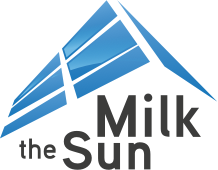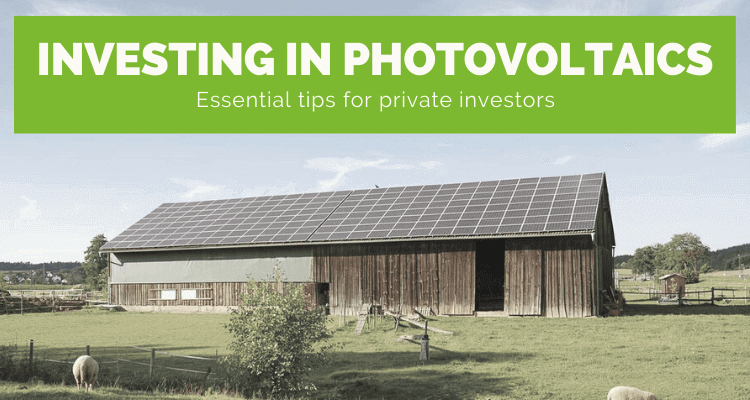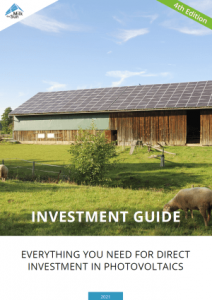Investing In Solar PV: The Most Important Tips For Private Investors
Photovoltaic systems have been a safe and stable investment for many years. What is often unknown is that you do not always have to build your own to become the owner of a photovoltaic system.
A large number of existing plants in Germany are sold on long before the state-guaranteed feed-in tariff for the electricity produced expires. This makes already-operating photovoltaic systems an interesting investment opportunity for private investors who do not want to build their own. We show what you should consider if you want to invest in photovoltaics.
Is solar PV a good investment?
The capital market today offers an almost unmanageable variety of investment opportunities – shares, bonds, funds, real estate… and direct investments in solar PV. Investing in photovoltaic systems is a sustainable choice towards which more and more private – and corporate – investors turn.
Solar PV is not only a fast-growing technology with an attractive risk-return profile, but it also has a low production volatility – and this is why it is such an attractive investment for many. Besides, the environmental awareness about climate change keeps on growing, and more and more people feel like they have a role to play in the energy transition – investing in clean energy and thus sustaining its development becomes an evident option when one has the means to do so.
The choice of a new investment depends on the risk diversification in the existing portfolio and the objectives of the investor. Do you opt for a higher-yielding, usually higher-risk investment, or a lower-risk investment with a generally lower return? How long may the capital be tied up?
Like real estate, direct investments in solar PV are comparatively stable. They are generally more crisis-resistant than bonds or equities and offer an interesting long-term return. Thanks to effective marketplaces, these tangible assets are now also very liquid.
1. Determine the investment goals and budget
Professional investors have been investing their capital in the secondary market of solar PV for a long time. Private investors with a smaller budget starting at around 20,000 euros, however, have so far faced the challenge of finding a suitable photovoltaic system at all. Thanks to prosperous PV marketplaces such as Milk the Sun’s, private investors also have access to direct investments in solar.
Small investment volumes are also possible
The amount to invest in a running solar power plant depends on the available liquidity of the investor who can spend in this asset class. In general, solar investments can be made in almost any size.
From a few thousand euros to the million-euro range, there are many investment opportunities in photovoltaic systems. This means that even investors with a relatively small amount of investment capital can purchase the entirety of a solar plant by themselves.
Good returns can be achieved
In Germany, the achievable returns when investing in an already-operating PV system can be in the mid to upper single-digit percentage range. Thanks to the legally regulated feed-in tariff, photovoltaic systems generally offer stable and reliable income over a total term of 20 years.
Calculate the return on your investment
A variety of tools make it possible to determine the return on your (potential) investment in a specific photovoltaic project. For example, the PV returns planner can be used to calculate the current return for a planned investment in just a few steps. It will give you a detailed valuation of the system or project, determine the expected return according to the market factors, present the yield and its optimisation potential based on the cost structure, and much more.
This is particularly useful for investors who want to present a solid calculation of the expected returns to a bank. But this is equally useful for owners who want to sell and PV operators who want to compare the originally expected performance to the current returns, and in general in order to find potential optimisation and how it could impact the returns.
2. Find a suitable solar PV project
On our online marketplace, interested investors can find suitable photovoltaic projects for their particular investment size.
We support investors in finding the right direct investment, provide project details and the possibility to compare location and technology. The contract is concluded directly with the previous owner.
Milk the Sun is a neutral mediator between buyer and seller. To make the transaction as simple as possible, the platform also offers a wide range of services related to the transaction and the life cycle of photovoltaic plants.
The goal being: potential buyers should be able to accurately estimate the value of the current plant and all upcoming operating costs.
3. Get a financing for your solar project
Banks are usually happy to finance photovoltaic systems with proven technology, with the legally regulated and secured feed-in tariff and the resulting easily plannable cash flows. In principle, photovoltaic projects are financed in two ways:
The most common way is project financing (cash flow-based non-resource financing), in which the repayment of the borrowed financing funds is made solely from the income to be generated in the future (cash flow). In the case of project financing of solar plants, the bank grants its loans based on the free liquid funds, the full collateralisation of the photovoltaic project and its revenues. The amount of debt financing is mainly measured by the liquidity surplus of the plant/project, which can be used to repay the loan. Usually, a debt ratio of 70 to 85% is expected.
Alternatively, the bank can base the photovoltaic financing on personal creditworthiness and the provision of special collateral.
Checklist of the required documents
To evaluate the plant and calculate the financing that will be required, the bank asks various information in advance. This includes:
- Project description with the essential technical components
- Land registry excerpts, cadastral maps and lease agreement
- List of all running costs of the system (e.g. lease costs, operating costs, insurance, cleaning)
- Yield report
- Profitability calculation
Important note:
When choosing the right bank, keep in mind that some of them are subject to the regional principle and are therefore only allowed to finance projects from the region.
Besides, the terms and conditions of the financing bank should be an important criterion. In addition to the term of the loan, interest rates and fixed interest rates, points such as unscheduled repayment rights and the calculation of early repayment penalties in the event of early repayment of the loan should also be the subject of negotiations.
Milk the Sun works with banks specialising in photovoltaics and supports you in finding the optimal financing or refinancing for your project.
4. Technical and commercial due diligence
Before buying a running photovoltaic plant, investors can and should have a so-called “due diligence” carried out by independent experts such as engineering and appraisal offices. That way, the strengths and weaknesses of the plant as well as the corresponding risks can be analysed, and the actual value of the solar power plant is determined. Buyer and seller jointly determine when and to what extent the plant will be inspected.
Technical due diligence
During a technical due diligence, all technical documentation and contracts are reviewed, including their completeness:
- Feed-in contract
- Expert opinion on yield and longevity of the solar modules
- Previous feed-in results of the PV system
In addition, the actual quality of the modules and components as well as the design and installation are checked on site.
Commercial due diligence
The commercial due diligence shows which obligations and liabilities, such as maintenance contracts or insurance policies, have to be purchased. It also shows how the plant is financed, how remuneration is contractually regulated and which guarantees and liability claims and obligations exist. Moreover, the tax situation of the operating company is assessed. This is usually carried out by a tax consultant.
A specialist lawyer should also be consulted on the exact formulation of a purchase agreement.
The complexity of a due diligence also depends on the type of transaction. A decision is made here between an asset deal and a share deal.
5. Detailed information
Direct investments in solar power plants have never been so easy. Have we sparked interest in investing in photovoltaics? You should then download our free investment guide, now in its fourth edition. You will find the most important information for private investors on direct investments in PV systems, and how to invest successfully and safely in Germany at a glance:
This is a free translation. To read the original article in German: click here.






